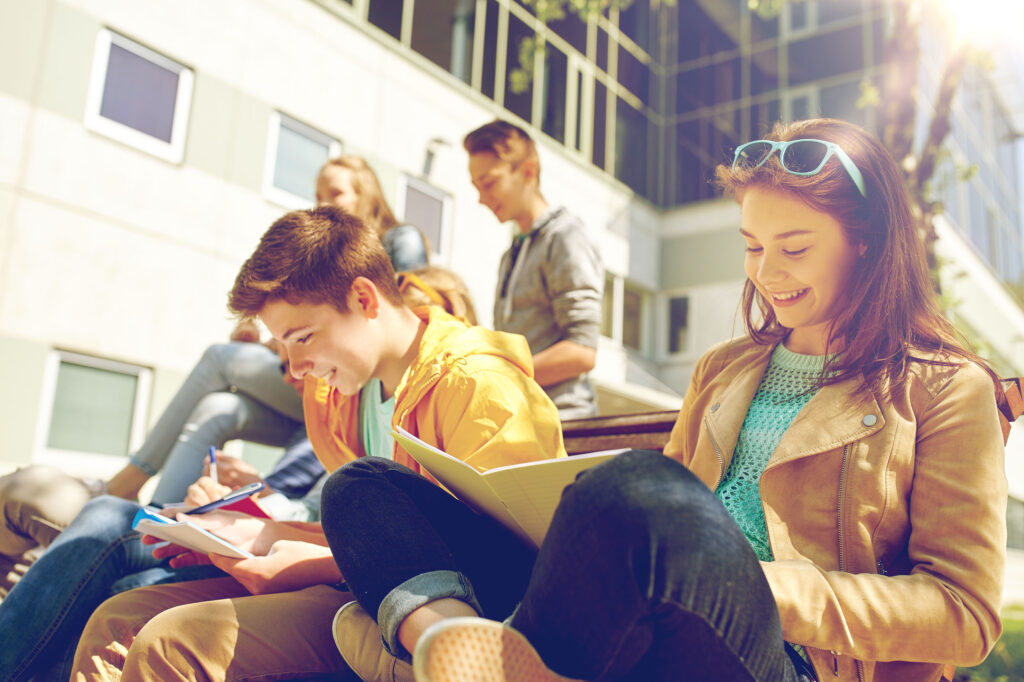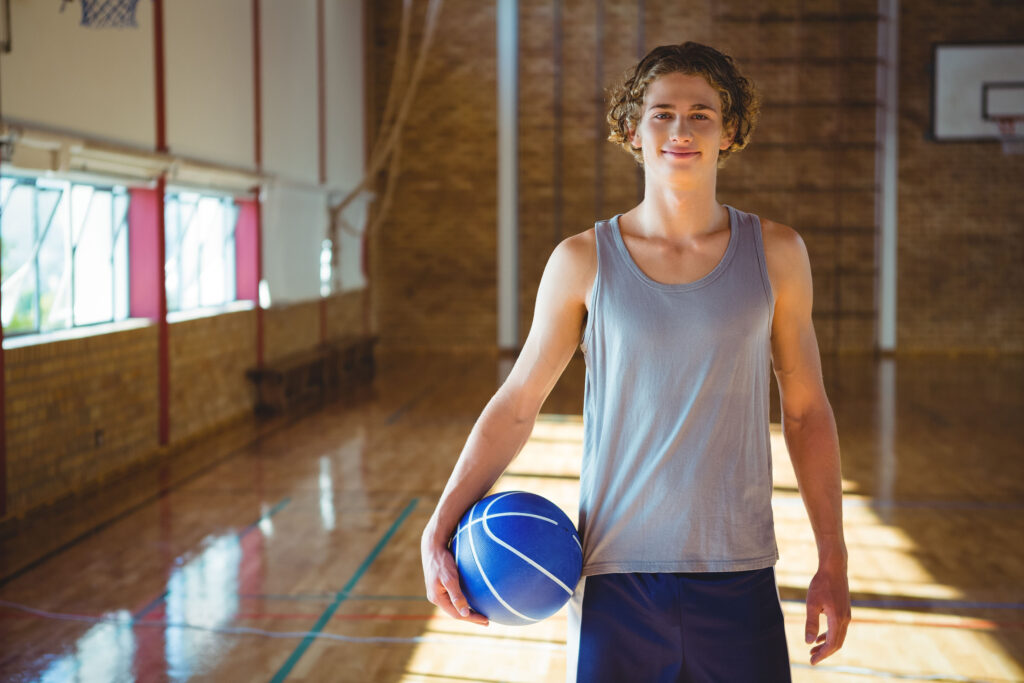AYP (Academic Year Program) details
The school in France, the school calendar, the host family, the boarding school, the travel and transfers, the visa formalities to come to France: click on the summary below to find out more about the Academic Year program ↓

The school in France
Public or private, it constitutes the essence of the academic year program and contributes in a large part to the integration of the student in France. Each school system is different with its own objectives, rhythm, subjects, pedagogy and teacher/student relationships. This complementarity with the French school system offers young people new learning opportunities, which are real sources of motivation.
In France, there is about 80% of public schools for 20% of private schools. However, they are all under contract with the Ministry of National Education and must follow the same curriculum and students pass the same national exam which is the Baccalaureate.

The difference is mainly in the teaching of religions in the private sector and that public schools are secular.
Private institutions can, however, adapt teaching methods and are free to add subjects and classes.
The French school system and courses during an academic year program
Upon arrival at the school, the student is taken in charge by an educational advisor who studies with him his future schedule according to his profile and his interests. Classes take place over a full day. The teaching methods are the same in each school and students will follow a common and national curriculum.
French High School students go to school 5 days a week: Monday, Tuesday, Thursday and Friday for a full day (lessons from 8:00-9:00 to 16:00-18:00) and in the morning on Wednesday or Saturday (depending on the school) from 8:00 to 12:00. On average the weekly timetable includes more or less 27 hours of lessons.
For example, the second class (first year of high school) includes one or two optional courses to choose among a list, and theses lessons, common to all students :
– French: 4h/week
– History – Geography: 3h
– Modern languages A and B : 5h30
– Economic and social sciences (SES): 1h30
– Mathematics: 4h
– Physics-chemistry: 3h
– Life and Earth Sciences : 1h30
– Physical education and sports: 2h
– Moral and civic education: 18 hours per year
– Digital sciences and technology: 1h30
Typical daily timetable of a French student
The students usually receive 4 hours of lessons with a 15-minute break at 10:00.
The students usually have a 1 – 2 hour break. They can go home to eat or eat with their friends at the school canteen (normally self-service with a limited choice of meals). Access to the canteen usually requires pre-payment for the meals which is recorded on a magnetic card that the students present at the canteen entrance (1 passage = 1 meal).
The students receive 3 – 4 hours of lessons with a 15-minute break at 15:30/16:00.
The students have “homework” to do (exercises, lessons to learn, research to carry out…).
School holidays of an academic year program
Apart from the 2 months summer holidays in July and August, the French educational system proposes 4 vacations session of 2 weeks during the year:
- Autumn: end of October – beginning November
- Christmas: end of December – beginning January
- Winter: February – March
- Spring: April
Vacation dates might change in function of the placement area.
Students usually stay in their host families during vacation, they can travel with SILC in another country or go back to their country after agreement with SILC.
The activities
Activities must play an important role in the student’s life; they are sporting, artistic, social, cultural, they contribute to the benefits of exchanges and therefore to a better integration and enrich their experience of an academic year program.
Unlike the Anglo-Saxon countries, activities are extra-curricular and take place in clubs and associations outside of school on Wednesday or Saturday afternoons, or after school during the week.
But we will help you organize and enroll student in local clubs so that they can continue their passions and hobbies.

The host family
During his academic year program, an host family welcomes the student as a full member of its family. There is no typical profile: the family can consist of a couple with or without children, a retired couple, a single-parent family. Volunteer or compensated (depending on the destination), they are motivated and ready to share her daily life with a student for several months.
It is selected and recruited by SILC. The first contact is followed by a home visit to check the motivation of the family but also the proximity of the school, reception conditions, comfort and hygiene of the house.
During this meeting, we clearly explain the requirements of this program to the family and estimate, after the interview, its ability to receive.

It is the family that chooses the student they want to welcome, depending on their file. The letter is to be filled with the greatest care by the student since it is he who will allow the family to identify the affinities or incompatibilities with the various young people who will be presented.
There is no ideal family, no more than an ideal participant. The success of the stay is due to the quality of the relationship that is built day after day and, as in all families, there are difficulties to overcome and happy moments to share.
The boarding
It is an alternative for student who prefer community life to that of the host family or for those who are already interned in their country.
By choosing this type of accommodation, the student manages his daily life and his schooling; he becomes more independent and autonomous by this obligation to control his rhythm of life. The times of exchange and sharing with young people of her age favor her integration. In this new environment, he must be open-minded, respectful and tolerant in order to fully enjoy this community life rich in new experiences and moments of shared joy.
SILC selects the institution in which the student will be educated, having taken care to check beforehand that the latter meets all the criteria we require. Quality of the infrastructures, restoration, supervision, follow-up of its schooling, all these elements are examined and contribute to the selection of the school.

Travel, transfers and on-site travel
International travel is at student’s expense and initiative; however, SILC is an authorized travel agency and can take care of it if the student wishes.
If he makes the reservation himself, he must wait for confirmation of the student’s placement in the host family before buying the tickets. Upon arrival, the student will be taken care of and his transfer will be assured until his host family or his school if it is internal. For his movements on site, the student may have to use public transport, depending on the distance between home and school.

Follow-up of the stay
SILC recruits host families directly and carries out a systematic control of the environment in which the student will evolve.
Our High School Programs Department is in direct contact with host families and schools. In order to control and make a point with young people, we have representatives within 2 hours. SILC makes a monthly check with families and students so that they can send a report on the student’s development in their family and school.

Orientation stay in Paris
Every year, for students who have confirmed for a school year, SILC welcomes student directly to airports and train stations in Paris to ensure the transfer and usually accompany the students for 4 days, for an orientation stay.
This trip allows student to meet their SILC counsellor.
This orientation stay can also be organised a few weeks after the participant’s arrival; but in the meantime, the students are closely monitored by the SILC team to ensure that they are well integrated in their families and schools, and understand the program.

Visa formalities
Every student with a passport from the European community will be exempt from Visa.
On the other hand, each student with a passport outside the European community will have to check the conditions of eligibility and will be able to obtain the complete procedure or to register online by following the link below. SILC will provide the necessary documents to obtain it.
